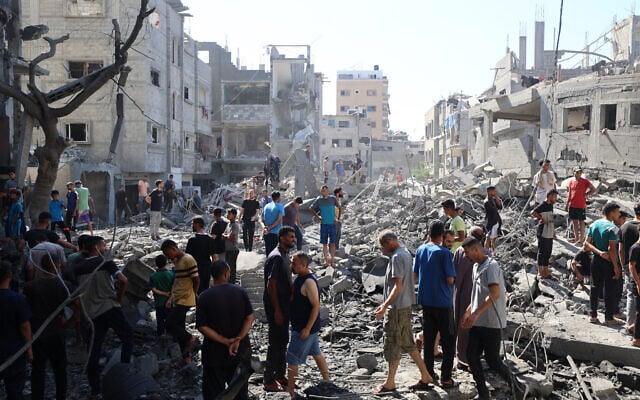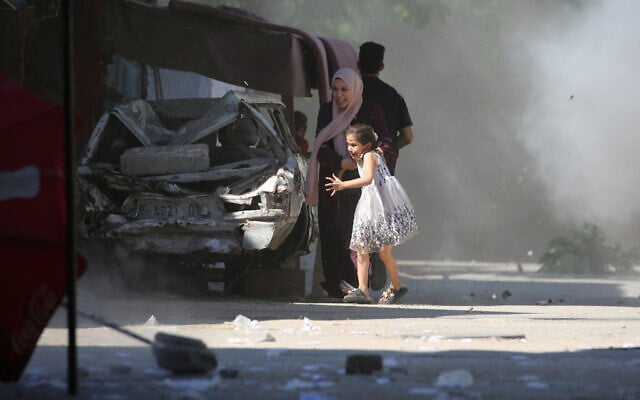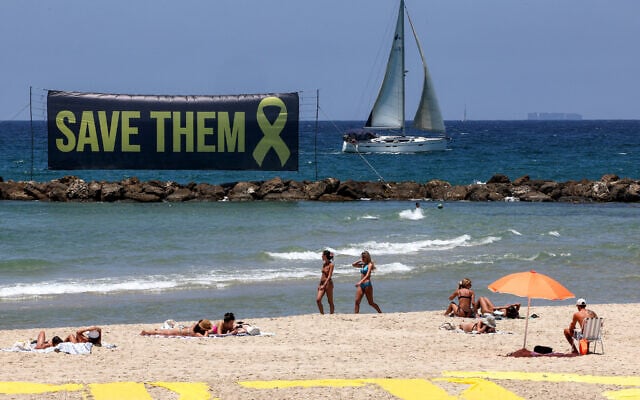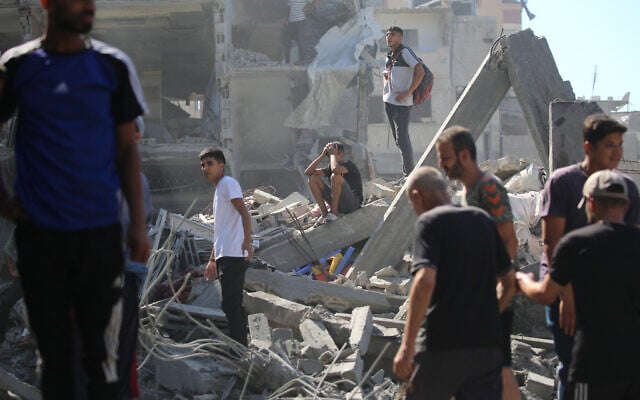


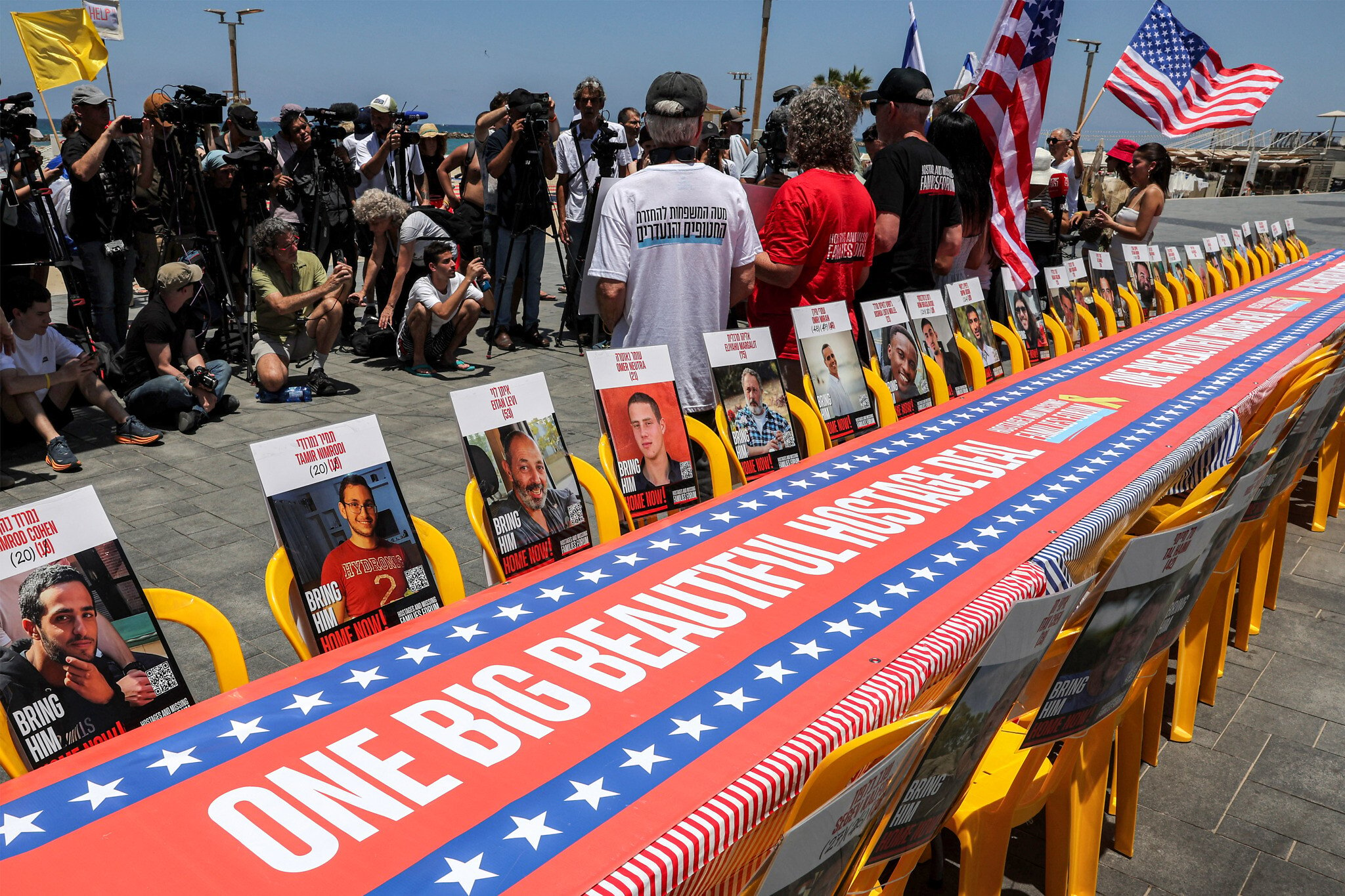
Hamas announced Friday that it had submitted a “positive” response to the latest proposal for a Gaza ceasefire and hostage release agreement, adding that it was prepared to “immediately” begin proximity talks with Israel to close remaining gaps, but a source involved in mediation efforts told The Times of Israel that the terror group’s reply included three reservations on core issues, leaving significant hurdles to overcome.
“The movement has delivered its response to the brotherly mediators, which was characterized by a positive spirit. Hamas is fully prepared, with all seriousness, to immediately enter a new round of negotiations on the mechanism for implementing this framework,” Hamas said in a statement, which made no mention of any reservations.
But the source involved in the mediation effort said Hamas wants clearer language regarding the possibility that negotiations on a permanent ceasefire aren’t finished by the end of the 60-day proposed truce.
The text presented to Hamas states that the 60-day ceasefire can extend, so long as the sides are negotiating in good faith. But the source said Hamas wants the latter condition dropped, viewing it as a window Prime Minister Benjamin Netanyahu will exploit to resume the war, as he did in March, collapsing an agreement reached in January before its second stage. Accordingly, the source said Hamas wants the proposal to state that talks on a permanent ceasefire will continue until an agreement is reached — something Israel has opposed, fearing that Hamas will drag out the talks indefinitely.
Another Hamas reservation pertains to aid, which the terror group wants to fully resume through mechanisms backed by the United Nations and other international aid organizations, the source said, noting that assistance could still flow through the controversial, US- and Israeli-backed Gaza Humanitarian Foundation. However, they clarified that Hamas would not accept the current system whereby Israel severely restricts the amount of UN aid allowed in.
An average of less than 70 trucks of aid has been entering Gaza each day since Israel lifted a blockade on the Strip after 78 days. International organizations say hundreds of trucks per day are needed to address the dire need in the Strip. The extent of the crisis has been highlighted by the utterly chaotic scenes at GHF distribution sites, which thousands of Palestinians have been willing to walk long distances while coming under IDF fire on a near-daily basis in order to reach due to the severe lack of food in Gaza.
The third reservation in Hamas’s response pertained to the withdrawal of Israeli forces during the truce, with the terror group demanding that the IDF retreat to positions it maintained before the collapse of the previous ceasefire in March.
All three reservations are likely to receive pushback from Israel, given that Netanyahu has insisted from the get-go that Israel maintain the ability to resume fighting, rather than agree up-front to a permanent ceasefire. Jerusalem has argued that ending the war would leave Hamas in power and able to regroup, though, critics of the government have maintained that Israel has already sufficiently dismantled the terror organization.
Israel is also opposed to aid mechanisms other than GHF, arguing that they allowed Hamas to divert large amounts of humanitarian assistance.
Israel has also taken over large swaths of territory, including the so-called Morag Corridor in southern Gaza, where it will likely push to keep its troops, similar to the Philadelphi Corridor, which straddles the Egypt-Gaza border.
The source familiar with the mediation effort said that despite the Hamas reservations, they expected that the sides would still be able to move ahead with proximity talks, which could take place in Doha as soon as Sunday.
But US special envoy to the Mideast Steve Witkoff had been pushing for Hamas to accept the mediators’ proposal as is, so that only a small number of issues would need to be raised during proximity talks. Those included the number and the identities of the Palestinian prisoners to be released in the deal and the maps marking the withdrawal of Israeli troops.
It wasn’t immediately clear whether Israel and the US would deem Hamas’s reservations as limited enough to proceed with proximity talks.
US President Donald Trump has been pushing for a deal since he brokered another ceasefire between Israel and Iran on June 24, and he expressed his hope earlier this week that a ceasefire would be reached next week. He made similar comments the week before, though.
The deal on the table would secure the release of half of the 20 remaining living hostages, with eight freed on the first day and two released on the 50th day, according to an Arab diplomat from one of the mediating countries.
Roughly half of the remaining slain hostages would also be released, with five being freed on the seventh day, five more freed on the 30th day and eight more freed on the 60th day.
While Hamas has offered to release all of the hostages in one batch, Netanyahu — under pressure from far-right coalition partners — opted for the phased framework in order to maintain the ability to resume the war. Accordingly, Hamas demanded more staggered releases to ensure that Israel remains at the negotiation table.
A Netanyahu aide told Israeli reporters after midnight on Saturday that Israel had received Hamas’s response and was studying its contents.
Meanwhile, Palestinian Islamic Jihad — a smaller Gaza terror group that is aligned with Hamas in the war and also holding hostages, issued a statement backing plans to hold proximity talks with Israel, while seeking “guarantees.”
“We presented (Hamas) a number of detailed points on the mechanism for putting in place the mediators’ proposal, and we want additional guarantees to assure us (that Israel) will not resume its aggression after (hostages) are freed,” PIJ said in a statement issued shortly after Hamas’s.
The proximity talks are expected to be very difficult, with Israel reportedly fearing that Hamas will try and increase the proportion of Palestinian security prisoners that are released for every hostage.
And if those talks succeed, the subsequent negotiations on a permanent ceasefire are likely to be even thornier, with Israel demanding the disarmament of Hamas and the exile of its leaders — conditions that the terror group has long rejected. Netanyahu reportedly told security cabinet members earlier this week that he wanted to fight in Gaza until the last Hamas gunman is defeated.
Hamas had been deliberating the latest ceasefire proposal since Tuesday when Trump announced that Israel had accepted it.
Trump’s aides met with Netanyahu-confidant and Strategic Affairs Minister Ron Dermer in Washington, consulting with him on the terms of the deal before the president’s Tuesday announcement.
Trump will host Netanyahu at the White House on Monday for the Israeli premier’s third visit in six months. No other foreign leader has been in the Oval Office more than once since the start of Trump’s second term.
On Thursday, Trump hosted former American-Israeli hostage Edan Alexander at the White House and reportedly pledged to secure the release of the remaining 50 captives.
On Friday, he told reporters that Gazans have “been through hell,” dodging a reporter’s question about whether he still plans for the US to take over the Strip.
“I want the people of Gaza to be safe,” he answered.

